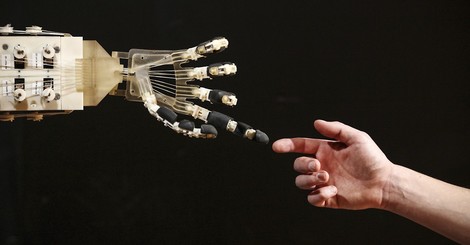Your podcast discovery platform
Curious minds select the most fascinating podcasts from around the world. Discover hand-piqd audio recommendations on your favorite topics.

piqer for: Global finds Technology and society Globalization and politics
Elvia Wilk is a writer and editor living in New York and Berlin, covering art, architecture, urbanism, and technology. She contributes to publications like Frieze, Artforum, e-flux, die Zeit, the Architectural Review, and Metropolis. She's currently a contributing editor at e-flux Journal and Rhizome.
Should Robots Be Baptized?
In 2014, Pope Francis sat down to consider how the Catholic church should handle an alien encounter. If Martians were to land, he surmised, the church would probably require they be baptized. But who would baptize them? A human, or one of their kind? And what about the sentient, nonhuman entity we're more likely to encounter soon: artificial intelligence?
It might seem silly for the pope to entertain such science-fiction scenarios, but the Catholic orthodoxy has always had a relationship with speculative futures.
After all, the nature of thought is fundamental to much theological postulation over the centuries: issues of free will, morality, soul-body distinctions, resurrection, and redemption are thick throughout biblical texts and their analyses.
The limits of human agency and the mystery of the soul are the central mysteries of Catholicism—and also happen to be the central questions of lifelike artificial intelligence. If AI could conceivably have a soul, could they also have faith and religion?
“Can AI be ‘saved’? Would artificially intelligent beings be better Christians than humans are?”
Given that notions of intelligence are changing and expanding to include artificial intelligence and maybe even someday alien life forms, imagining how religion should account for non-human consciousness is a lively way for the Catholic church to (re)consider its own philosophy for the present day.
Stay up to date – with a newsletter from your channel on Technology and society.
